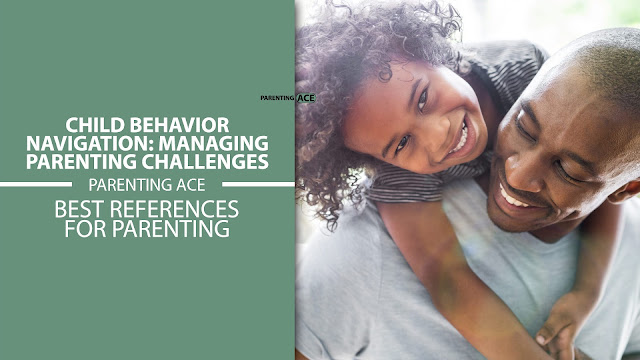Navigating the Seas of Child Behavior: A Guide to Managing Behavior Challenges in Parenting
Navigating the turbulent waters of parenting, managing a child's behavior stands as one of the most daunting yet pivotal challenges. In this blog post, we embark on a journey through the intricacies of behavior management, exploring its profound impact on children's development and the multifaceted strategies parents employ to navigate these challenges. From understanding the roots of behavior issues to implementing effective strategies rooted in empathy and consistency, join us as we delve into the art of guiding our children towards emotional resilience, social competence, and a brighter future.
 |
| Child Behavior Navigation: Managing Parenting Challenges |
Parenting, while immensely rewarding, comes with its fair share of challenges, and managing a child's behavior ranks high among them. Behavior management is not merely about correcting misbehavior; it's a delicate balance of understanding, guidance, and consistency. In this article, we delve into the complexities of managing behavior in parenting, exploring its challenges, strategies, and profound impact on children's development.
Understanding Behavior Challenges
Behavior challenges can manifest in various forms, from tantrums and defiance to aggression and withdrawal. Each child is unique, with individual temperaments, triggers, and coping mechanisms, making behavior management a nuanced process. External factors such as environmental stressors, family dynamics, and societal influences further complicate the landscape of behavior management.
The Impact of Behavior Management
Effective behavior management lays the groundwork for a child's emotional regulation, social competence, and academic success. Conversely, mishandled behavior issues can lead to negative outcomes, including low self-esteem, strained relationships, and academic underachievement. The way parents respond to behavior challenges significantly shapes a child's perception of themselves and their interactions with the world.
Challenges in Behavior Management
Balancing firmness with empathy, consistency with flexibility, and discipline with understanding poses significant challenges for parents. Time constraints, fatigue, and personal stressors further exacerbate the difficulties of managing behavior effectively. Moreover, navigating the complexities of sibling dynamics, peer influences, and societal expectations adds layers of complexity to the task at hand.
Strategies for Effective Behavior Management
- Positive Reinforcement: Acknowledge and reward positive behavior to encourage its repetition, reinforcing desired actions.
- Clear Expectations: Establish clear rules and expectations, outlining consequences for both positive and negative behavior.
- Consistency: Enforce rules consistently and fairly, avoiding mixed messages that may confuse children.
- Effective Communication: Maintain open lines of communication, actively listening to children's concerns and addressing underlying issues.
- Modeling Behavior: Lead by example, demonstrating the behaviors and values you wish to instill in your children.
- Emotional Regulation: Teach children healthy coping mechanisms for managing emotions, fostering resilience in the face of challenges.
The Role of Parenting Styles
Parenting styles play a crucial role in behavior management, influencing the dynamic between parents and children. Authoritative parenting, characterized by warmth and clear boundaries, tends to yield the most positive outcomes in behavior management. Authoritarian, permissive, and uninvolved parenting styles may present challenges in establishing effective behavior management strategies.
Managing behavior in parenting is a multifaceted endeavor that requires patience, understanding, and commitment. By employing a combination of positive reinforcement, clear expectations, and effective communication, parents can navigate behavior challenges while nurturing their children's emotional and social development. Ultimately, the way parents manage behavior profoundly impacts children's growth, shaping their perceptions, relationships, and future success.




